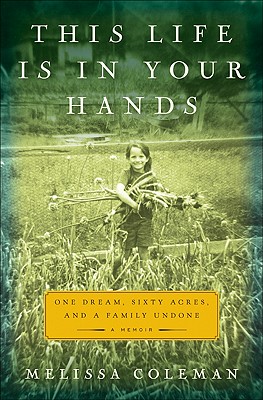Set on a rugged coastal homestead during the 1970s, This Life Is in Your Hands introduces a superb young writer driven by the need to uncover the truth of a childhood tragedy and connect anew with the beauty and vitality of the back-to-the-land ideal that shaped her early years.
In the fall of 1968, Melissa Coleman's parents, Eliot and Sue—a handsome, idealistic young couple from well-to-do families—pack a few essentials into their VW truck and abandon the complications of modern reality to carve a farm from the woods. They move to a remote peninsula on the coast of Maine and become disciples of Helen and Scott Nearing, authors of the homesteading bible Living the Good Life. On sixty acres of sandy, intractable land, Eliot and Sue begin to forge a new existence, subsisting on the crops they grow and building a home with their own hands.
While they establish a happy family and achieve their visionary goals, the pursuit of a purer, simpler life comes at a price. Winters are long and lean, summers frenetic with the work of the harvest, and the distraction of the many young farm apprentices threatens the Colemans' marriage. Then, one summer day when Melissa is seven, her three-year-old sister, Heidi, wanders off and drowns in the pond where she liked to play. In the wake of the accident, ideals give way to human frailty, divorce, and a mother's breakdown—and ultimately young Melissa is abandoned to the care of neighbors. What really happened, and who, if anyone, is to blame?
This Life Is in Your Hands is the search to understand a complicated past; a true story, both tragic and redemptive, it tells of the quest to make a good life, the role of fate, and the power of forgiveness.
Read an excerpt.
Joe says:
"Melissa Coleman did not have the 1970's childhood many of us did: she was raised in rural Maine on a farm without electricity, in a family that helped pioneer the back-to-the-earth movement. It was a fun life, but a tragic one. When Melissa was seven years old, her little sister drowned in the family's pond. It was an event that tore apart their family, and changed all of their lives. This book is as much about the quest to understand fate as it is a book about the hard work it takes to live a life off the grid.
This book is full of heart-warming reminisces of her childhood, made all the more heart-breaking by the end of the book. Melissa Coleman's story is not only about her, but about her parents, Eliot and Sue, and the community of like-minded individuals that lived on and near their farm on the coast of Maine. Many of these people were the ones who worked hard on the groundbreaking work regarding the organic movement. Coleman writes with honest passion in a style at once homespun and powerfully emotional."
In the fall of 1968, Melissa Coleman's parents, Eliot and Sue—a handsome, idealistic young couple from well-to-do families—pack a few essentials into their VW truck and abandon the complications of modern reality to carve a farm from the woods. They move to a remote peninsula on the coast of Maine and become disciples of Helen and Scott Nearing, authors of the homesteading bible Living the Good Life. On sixty acres of sandy, intractable land, Eliot and Sue begin to forge a new existence, subsisting on the crops they grow and building a home with their own hands.
While they establish a happy family and achieve their visionary goals, the pursuit of a purer, simpler life comes at a price. Winters are long and lean, summers frenetic with the work of the harvest, and the distraction of the many young farm apprentices threatens the Colemans' marriage. Then, one summer day when Melissa is seven, her three-year-old sister, Heidi, wanders off and drowns in the pond where she liked to play. In the wake of the accident, ideals give way to human frailty, divorce, and a mother's breakdown—and ultimately young Melissa is abandoned to the care of neighbors. What really happened, and who, if anyone, is to blame?
This Life Is in Your Hands is the search to understand a complicated past; a true story, both tragic and redemptive, it tells of the quest to make a good life, the role of fate, and the power of forgiveness.
Read an excerpt.
Joe says:
"Melissa Coleman did not have the 1970's childhood many of us did: she was raised in rural Maine on a farm without electricity, in a family that helped pioneer the back-to-the-earth movement. It was a fun life, but a tragic one. When Melissa was seven years old, her little sister drowned in the family's pond. It was an event that tore apart their family, and changed all of their lives. This book is as much about the quest to understand fate as it is a book about the hard work it takes to live a life off the grid.
This book is full of heart-warming reminisces of her childhood, made all the more heart-breaking by the end of the book. Melissa Coleman's story is not only about her, but about her parents, Eliot and Sue, and the community of like-minded individuals that lived on and near their farm on the coast of Maine. Many of these people were the ones who worked hard on the groundbreaking work regarding the organic movement. Coleman writes with honest passion in a style at once homespun and powerfully emotional."

No comments:
Post a Comment